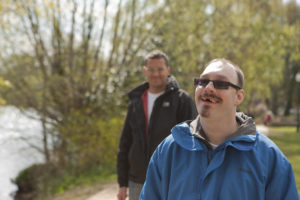
Naturally, families will feel wary or anxious about having a stranger come into their loved one’s home. With so many negative stories in the press surrounding care, families can also be uncertain about the safety and practise of finding care. This is where reassurance and an open conversation is the way forward.
From the first phone call, Helping Hands ensures that they are on hand to provide families with as much information as possible about what home care involves and does everything they can to put the family members’ minds at ease, whilst looking to arrange the solution which suits the individual. It is all about ensuring that the care is tailored perfectly to them. Some of the concerns that family members might have include:
• How soon can care start?
• How much will it cost?
• Can I trust the carer?
• Will the carer understand my loved one’s condition?
• Am I working with a quality provider?
• What training and support will my carer have?
• What if our needs change?
Communication plays a key role in finding the right care solution, and not just between the customer and the care provider; it is also important that the carer themselves know everything there is to know about their customer. What do they like to eat for breakfast? What are their hobbies? When do they like to go to bed? These are the seemingly smaller details which make the biggest difference to the wellbeing and comfort of the person receiving care.
Though care providers should make every effort to make the transition into care as smoothly as possible, there will inevitably be a settling-in period. Typically, the first week of having care can be the most difficult; the person receiving care and their family will need some time getting used to having a carer supporting them especially if they have been managing care themselves or if they are returning home from hospital or a care home. As with any new job or house move, the carer will also need some time to adjust to their new surroundings, and the support from the Helping Hands is vital in this period; in these first few days of a new placement working collaboratively between family, carer and manager is key. Great care should always be a flexible and adaptable process with the individual’s wellbeing at the centre.
Helping Hands’ commitment to collaboration was instrumental in helping Joan who needed additional support. After Joan experienced a fall, her daughter Amanda arranged for her to recover in a nursing home, though she felt that her mother would be much happier at home. After approaching Helping Hands and explaining what her mother required, we worked closely with her and Joan to find the live-in carer who would make a significant difference in Joan’s life. We looked to implement a tailored care programme that would allow Joan to have the lifestyle she wanted, and even enjoys days out with her carer!
“Mum had been struggling at home for a couple of years,” Amanda said. “Her health was deteriorating and she wasn’t eating or drinking properly. Carers came in during the day and for a night-time tuck-in and she had an emergency button to press should she need help. It was a constant worry to all the family as to whether she was ok. I often tried to call her during the evening and the phone would be engaged – she had forgotten to put it back on the hook properly. My stress levels spiked.”
“Mum’s and our family’s lives were transformed when she came home and her first live-in carer joined her. It wasn’t an easy decision opting for live-in care – we didn’t know whether it would work, however Mum understood that if she didn’t have full-time home care she couldn’t return home. We now no longer worry. She’s eating better than in years and has put on (some would say a little too much) weight! It’s a weight off our minds that’s for sure! In reality what first felt like an impossibility for my mum has now resulted in her having a better life than we could have possibly hoped for!”

We like to think we are a care provider who listens and makes every possible effort to give the individual receiving the care every chance to lead the lifestyle they want. It is important that the care provider works with the family to adapt their approach to suit the individual, tailoring the care to their needs. When this happens and the carer becomes a supportive companion, the relationship between them and the person they are caring for is healthy and the well-being of the individual improves. They will be surrounded by their memories, in their personal space, with their pets, family, and friends all around them. This is often the catalyst which enhances their quality of life. Arranging care in the home could be the best decision you’ll make!
Contact us today to find out more information about our home care services.
Read more about what is live in care here.
